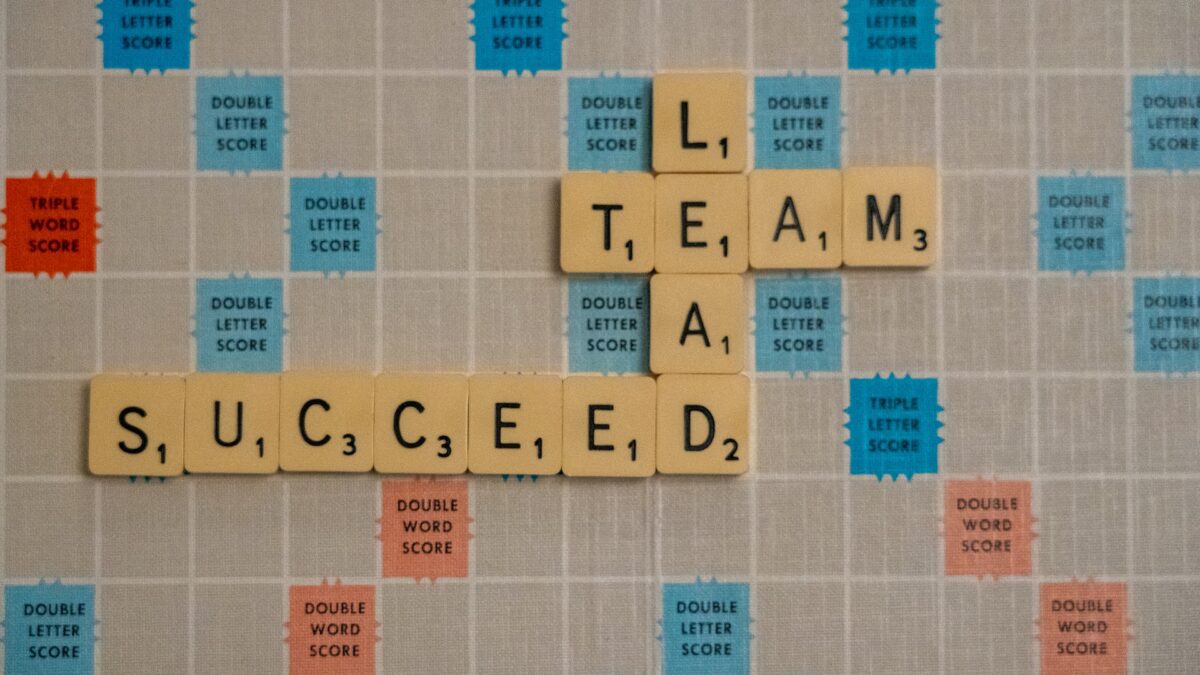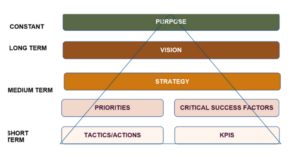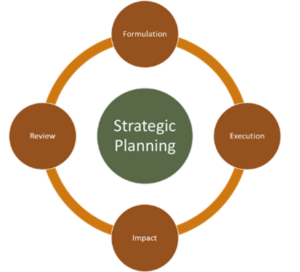
Difficult Conversations
March 18, 2022
Conflict is Good
April 18, 2022How to become a strategic leader
As you progress in your career you often need to move from being an operational leader to a strategic leader.
But the word ‘strategy’ can instil a feeling of fear into many managers. It may be because it sounds grander than it actually is, so we thought we’d ask Brenda Etchells, our associate and specialist in strategic planning, to help us de-mystify strategy.
So what is strategy?
In essence, a strategy is having a plan of how you will achieve your goals, objectives, and vision.
The strategy is one element of a bigger framework and aligns to an overall purpose and vision.
Everything starts with your why or purpose, and this should be a constant in your strategy – it’s the reason your business exists.
Your purpose may be general in nature or may have strong social elements. Here’s a useful definition of purpose that covers both aspects:
“An aspirational reason for being which inspires and provides a call to action for an organisation and its partners and stakeholders and provides benefit to local and global society”
(https://hbr.org/resources/pdfs/comm/ey/19392HBRReportEY.pdf)
Your vision is your long-term aim/objective – What does your business look like in, say, five years’ time?
The strategy is the medium-term plan on how you are going to achieve your vision, which in turn informs your areas of priority and focus, and drives the action plan.
So, strategy is simply having a plan?
Yes, and no! It is about having a plan but also having a process in place to ensure that the strategy evolves to meet the changing needs of your organisation, your customers, and to react to changes in the market. We advise companies to work to an iterative four-stage process:
For a strategy to be implemented successfully the whole organisation needs to be working together, in the same direction, to meet the same success criteria. So leaders and employees from across the business should be involved at all stages.
What does a strategic leader do at each stage?
The main difference between a strategic and an operational leader is thinking wider than just your function. This is no longer about operating in a siloed way but working at a higher level, as well as cross-functionally, and viewing the business through a wider lens.
- Formulation is where the strategy is developed through gathering research and insight. A strategic leader will:
- Scan the external environment to assess what could impact on the business
- Keep abreast of competitors and any potential market disruptors
- Adopt a mindset of continuous learning of technical/industry knowledge
- Go ‘back to the floor’ and/or talk to customer facing staff to find out what your customers are saying
- Have open discussions with other leaders across the business and with peers in the industry
- Be clear on the strategic direction and understand their remit
- Execution is where the planned actions are carried out. To be effective a strategic leader will engage their team as well as their key stakeholders. Some question to ask are:
- Who are you dependent on to achieve your objectives?
- With whom should you invest your time and energy?
- Who can help influence your outcomes?
- Who has a keen interest in your outcomes?
- Impact is where the outcomes are measured. There is a well known mantra “what gets measured gets done”, so a strategic leader will set the right objectives for their teams aligned to the overall company goals. A strategic leader will also be aware of the potential risks, limitations and challenges that may impact on a succesful outcome and will closely monitor these and address them with the right stakeholders in a timely manner. Considerations include:
- What are your longer-term objectives?
- What are the steps to achieving these?
- What is your immediate areas of focus?
- How will you measure success?
- How do your actions impact on other areas of the business?
- Are you all aligned or are there areas of conflict?
- Review is the linchpin of the process. A strategic leader doesn’t become complacent and is constantly looking to review, reflect, and refocus where needed. Strategies need to evolve to remain relevant – especially in fast-paced environments. The review stage would incorporate asking questions such as:
- Are we on track to achieve our goals? If not, why not?
- Is the current plan still fit for purpose? If not, what has changed?
- What are the internal areas of strength that give competitive advantage?
- What are the areas of weakness that need to be addressed to ensure future success?
- What new opportunities are there that the business can take advantage of?
- What new risks are there that the business needs to be aware of and have a plan to address?
Wow, that’s a lot to consider!
It is, so let’s make it simpler. Just remember to do these three things:
![]() Think strategically – use thought leadership to elevate yourself out of the operational
Think strategically – use thought leadership to elevate yourself out of the operational
![]() Act strategically – plan ahead and ensure alignment to overall strategic framework
Act strategically – plan ahead and ensure alignment to overall strategic framework
![]() Influence strategically – identify your stakeholders and keep them engaged
Influence strategically – identify your stakeholders and keep them engaged
If it is not natural, then you will need to push yourself out your comfort zone. It may be there are opportunities to lead on a cross-functional initiative or project that exposes you to the wider business. You can broaden your horizons by reading relevant journals or articles or attending industry events, as well as a host of strategy books and courses that are available. Another great way is to take on leadership roles outside your organisation, for example managing a grass roots sports team, or becoming a school governor.Many leaders will be doing this naturally by always being curious, asking ‘so what’ questions, challenging the status quo and by developing relationships with their peers across the business and wider industry.
How can managers and leaders develop these skills?
Finally learn from those around you whose strategic leadership skills you admire and ask them to coach you – or seek a mentor (from within or outside the organisation) who can help you to develop your confidence in this area and get you ready for your next career move.
How can Cube help?
You don’t have to do it alone. At Cube our associate partner Brenda has the specialist expertise to help you develop your strategic leadership skills through both workshops and one-to-one mentoring and support. Get in touch with us to see how we can help. Email chris.burton@cube-ld.co.uk or call 07879602002







